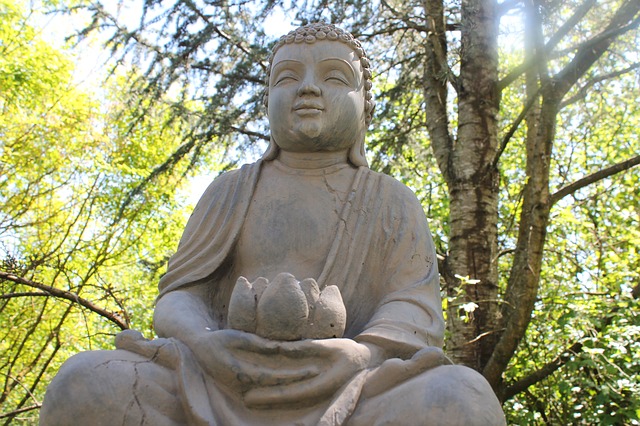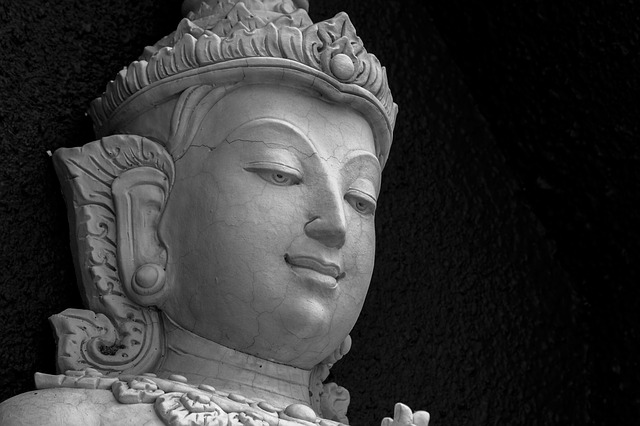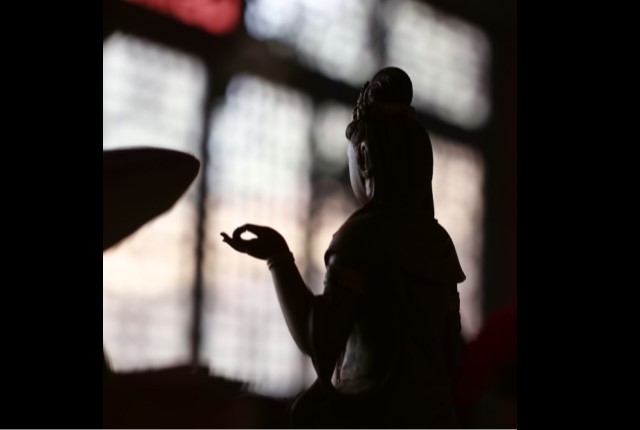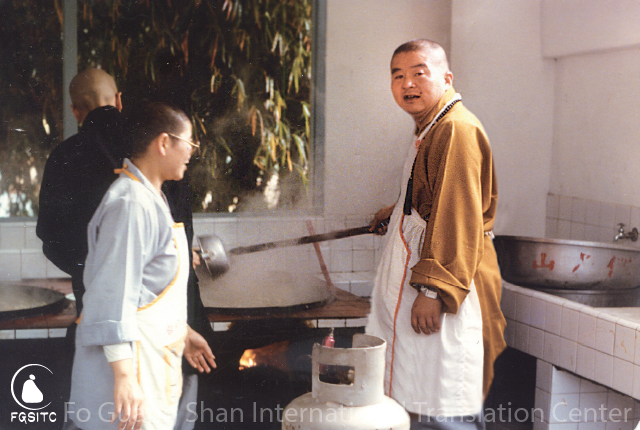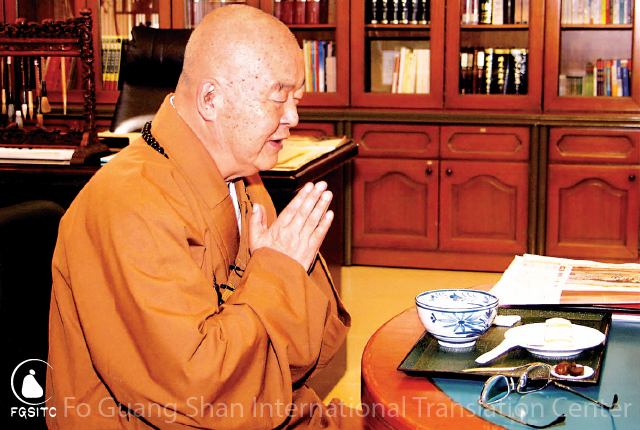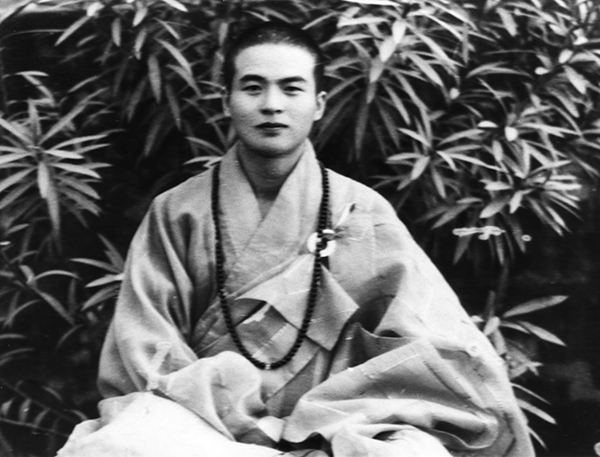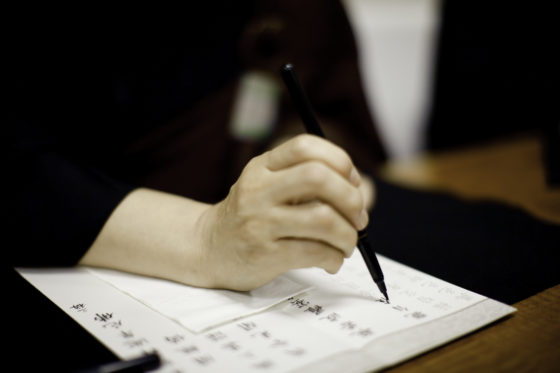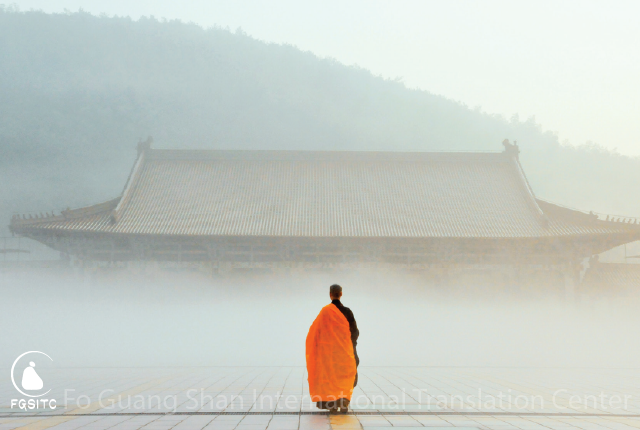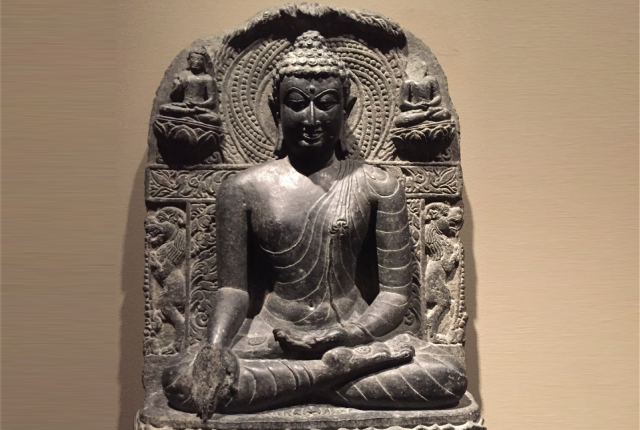
Sages from all religions who serve the multitudes without any monetary reward or recognition are volunteers of human society. An ancient sage once said: “Before one can become a prominent figure in Buddhist circles, one has to be a horse and an ox for all sentient beings.” Another said: “Before one attains Buddhahood, one first has to form affinity.” Over the generations, Buddhist monastics have participated in various charities and contributed considerably to the welfare of society. They have built roads and bridges, planted trees to create forests, dug wells to provide drinking water, erected tea pavilions to relieve travelers from thirst, protected animals from being slaughtered, rendered medical care, provided food, and emergency aid to the needy, founded temples, monasteries, orphanages, nursing homes, hospitals, schools, and other civil, cultural, religious, educational and charitable organizations. Some notable models are:
Venerable Master Huiyuan
His comment that “the monastic obeys not the emperors” reflects his emphasis on the role and contribution of voluntary social welfare organizations. The book pointed out that the merits of the monastics were comparable to those of the rulers in a feudal society, though without political clout or authority, the highly-respected monastics could have played an important role in public service and in the governing process. In particular, their goal was to liberate all human beings in the world, regardless of race, nationality, or geographic location. The monasteries can function as powerful institutions and organizations to serve the public, making the earth a pure land.
Venerable Master Tanyian
During the period of Emperor Wen in the Sui Dynasty, a great drought plagued the land and people experienced unbearable suffering. Master Tanyian held an Eight Precepts Buddhist Retreat that was participated in by Emperor Wen and his governors. At the end of this fast, heavy rain poured down from above and the drought was over.
Venerable Master Fajing
Anytime and anywhere there was a disaster or famine, Venerable Master Fajing was present to provide food and relief supplies. One time the famine was so bad that thousands were dying from hunger. The situation was desperate and miserable. With great compassion, he went every place seeking donations and help, convincing the government to release the emergency grain reserve to feed the people. Unfortunately, the number of hunger victims far exceeded the quantity of food supplies. In the end, Venerable Master Fajing decided to let the hungry people consume parts of his body to survive. What an incomparably fearless and compassionate spirit he displayed!
Venerable Master Zhiyi “The Wise Man”
Venerable Master Zhiyi was known for releasing fish and turtles into many “rescue ponds” he had built. He was also known to be a devoted philanthropist. In his biography, the following was noted: “One time he received sixty types of different offerings. Out of compassion and respect, he immediately gave them away to the needy in the hope that their happiness and welfare could be enhanced and that the country and society as a whole could prosper.”
Venerable Master Fachun
During a famine, Venerable Master Fachun, disguising himself in lay clothes, worked as a laborer in villages and towns, and donated all his wages to the poor and needy. He frequently volunteered to clean the toilets and remove feces and excrement. When the road was damaged, he himself would undertake the reconstruction work. He also encouraged neighbors and residents to level and smooth out bumpy and dangerous roads for the convenience of travelers.
Venerable Master Buddhacinga
Venerable Master Buddhacinga was known to have reformed the cruel rulers Shihle and Shihu by teaching them the Buddhist precept of no killing and by showing them various miracles. He also advised other governors “not to oppress people and not to kill the innocent.” Many people’s lives were saved because of his words.Buddhacinga knew a great deal about healing and medicine. Numerous people were healed or saved from death under his care.
Venerable Master Narendrayasas
During the time of Emperor Wexuan in the North Qi Dynasty, Venerable Master Narendrayasas traveled far south to the capital of Ye to translate Buddhist sutras. He devoted much of his time to charity, treating and taking care of many lepers.
Zen Master Tezgan
During the Tokugawa Bokufu period in Japan, Zen Master Tezgan discovered that one of the main reasons why Buddhism was not as prevalent as it should have been was the shortage of comprehensive collections of Buddhist Tripitaka. He vowed to raise funds to print volumes of Buddhist sutras. After years of effort, the amount of funds raised was close to the point where the printing of the sutras could have been started. Unfortunately, various disasters and calamities hit the area and people were dying or struggling to survive. Master Tezgan immediately donated his entire sutra-printing fund for relief purposes. Later, he resumed his fundraising activities for sutra printing. After all kinds of difficulties and hardships, he was reaching his goal again. But then a major flood came. Many people were homeless and struck by diseases. Again, he immediately donated all the money to relieve for the flood victims. His unshakable determination motivated him to continue his fundraising activities despite all these setbacks. On his third attempt, he finally accomplished his wish to print the complete volume of Buddhist Tripitaka. All the Japanese agree that “Master Tezgan in effect had printed three complete volumes of Buddhist Tripitaka. The first two volumes cannot be seen physically, but rather they were compassionately imprinted into the heart of the Japanese people.”
Venerable Master Taixu
During the Sino-Japanese War, to improve the railroad from Yunnan to Burma for the inflow of war supplies, Venerable Master Taixu risked his life by leading a Buddhist group, traveling to Burma and Thailand and publicizing the spirit and merits of Chinese culture. Because of his efforts, international support poured in from all over the world. The war economy was helped tremendously.
Venerable Leguan
During World War II, Venerable Leguan organized a medical group of monastic practitioners to provide medical and surgical treatment to injured soldiers as well as to civilians. They served their country well by risking their lives under showers of bullets and bombs.
To a Buddhist, what is important is not worldly skills and intelligence, but bodhicitta (the heart of compassion). Turn to any page of a Buddhist scripture, and one can easily find that all the Chan patriarchs and masters had vowed to serve others, to transcend self, and to exalt the value and meaning of living. Most of them led an ascetic life. For example, Chan Master Weishan Lingyou vowed to be reborn as an ox or a horse to serve other sentient beings. He would prefer to see other sentient beings happy rather than make his own life easy and comfortable. This is the true spirit of volunteerism.
In the history of Buddhism, many of the governing class were known to be volunteers or philanthropists. They were involved in activities such as praying for rain in time of drought or providing relief materials in time of calamities.
During the Peacock Dynasty of India, in an effort to make everyone benefit from Buddhism, the King of Magada, Asoka the Third, built pharmacies at the four gates of the city, providing free medicine to monks as well as to lay persons. Each day, he offered one thousand dollars to the statues and stupas of Buddha, another thousand dollars to the elder bhiksus, ten thousand to all other monks, and another ten thousand toward the purchase of medicines and supplies. Further, he planted trees on both sides of the road, and dug many wells to relieve travelers from their heat and thirst. Although he was the king of a nation, he acted more like a volunteer servant to everyone. As a consequence, the people were free from suffering and the nation was strong and prosperous.
In Japan, the founder of Japanese Buddhism, Prince Shotoku, had attempted to rule the country through Buddha’s teachings. He taught his subjects to take refuge in the Triple Gem. The Temple of Four Heavenly Kings, which he built in Osaka, consisted of four groups of structures designed for charitable relief, nursing care, medical treatment, and pharmaceutical prescriptions. The Temple provided the poor, the lonely, and the sick with free medical care, shelter, and relief supplies.
Emperor Wu of the Liang Dynasty was a devoted Buddhist. He avidly collected Buddhist scriptures, edited-sutras, and was very dedicated to Buddhist practice. He upheld the bodhisattva precepts and therefore was respectfully referred to as “The Emperor Bodhisattva.” In the 48 years that he was emperor, he governed the country with Buddhist doctrines. He erected many Buddha statues in gold and silver, constructed temples with names such as Compassion and Reverence, Deliverance with Wisdom, New Forestry, Dharma King, Cave of Ascetics, House of Light, Liberation, and Initiation to Virtue.
He convened assemblies of Buddhists without excluding anyone, offering meals and money to Bhiksus (monks), Bhiksunis (nuns), Upasakas (devotees), and Upasikas (female devotees). Several times he volunteered to be a servant in the Tongtai Temple, dedicating himself to the Buddha, Dharma, and Sangha. He participated in cleaning and maintenance, and helped in the kitchen and dining hall. He left himself a legacy in history as a strong devotee of Buddhism.
Today, many Buddhists are active volunteers in temples and monasteries. They know the importance of service to others to form affinity before they attain Buddhahood. Volunteer service is the door to good human relationships, improved communication, and friendship among people.
For hundreds and thousands of years, numerous volunteers have served at temples and monasteries, performing tasks such as sweeping the grounds, cleaning the yard, gardening, and fertilizing. Some of them have helped in building temples and monasteries. Some of them have helped by planting trees and raising funds. Compared to the past, today’s Buddhist volunteers are more united, and better coordinated and organized. For instance, they respond to the environmental movement, participate in blood drives, and join organizations to propagate Buddha’s teachings. Each one contributes whatever he or she has, working tirelessly as a group, serving and giving with a joyous heart, and practicing and protecting Buddhism with an unyielding spirit.
From Buddhism and Volunteerism, written by Venerable Master Hsing Yun.
Image from Pixabay.


